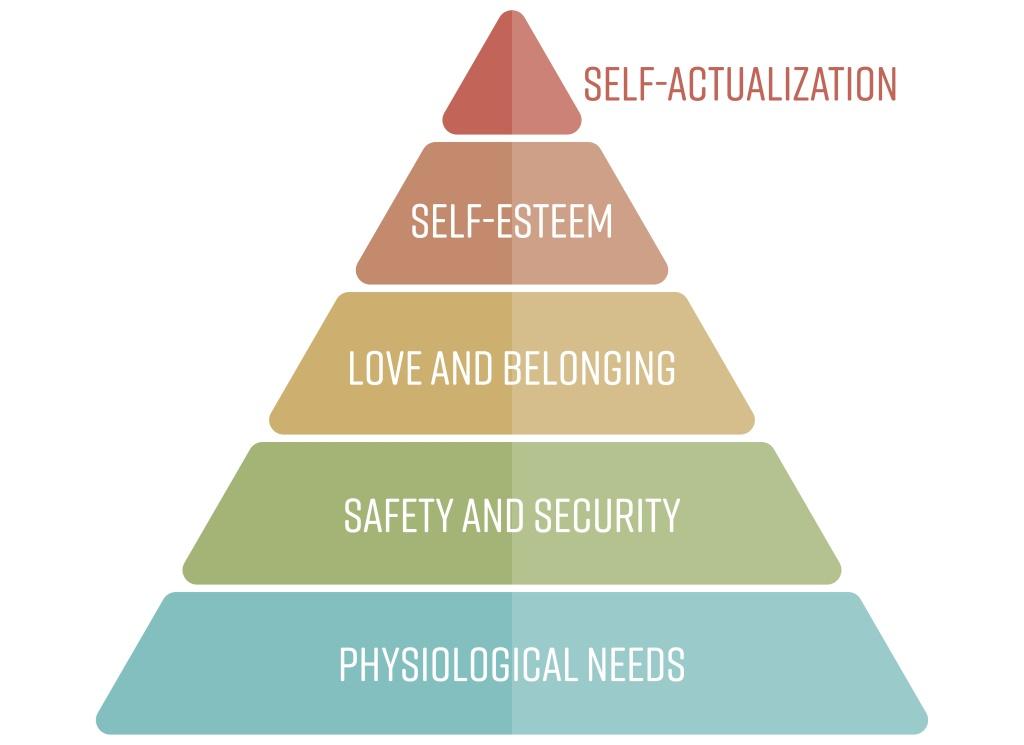Maslow’s Hierarchy of Needs has been around for decades. In case you’re not familiar with the model, here’s a quick summary. The needs of human beings are depicted as five levels of a pyramid with the most fundamental at the base. The premise is that as one need is satisfied, we move on to the next, progressing up the pyramid.

These five stages are:
1) Physiological – the basics we need to keep our bodies running and ensure immediate survival including food, water, air, sleep and shelter.
2) Safety – the next level of needs required for longer term survival such as physical security, health and, in our modern world, financial security.
3) Social belonging – our emotional needs including friendship, intimacy and having a sense of belonging.
4) Esteem – the need for both self-esteem and to be respected and valued by others.
5) Self-actualization – put simply, the desire to reach your potential (or is Maslow’s own words “to become everything one is capable of becoming”).
When people speak about what’s important to them as they move through their careers, I see this progression in action. I believe this model can be seamlessly translated to a work context.
Financial Security is the first step
In our career, we start at the safety stage focusing on financial security — the need to secure income to pay for necessities and to avoid financial stress.
Then we start to look for more. The people we work with, and in particular the boss we work for, become incredibly important. People in this stage are seeking to be treated with respect and ideally feel affiliation and belonging within their work team.
The next stage is then to be held in ‘esteem’. This can mean being recognized as a high performer or expert in your discipline which leads to respect for your knowledge, wisdom and experience.
Leaving a legacy
The final level is, to me, the most exciting. I work primarily with people who have achieved success in their profession (and I mean success in the traditional sense of reaching a level of seniority) but are driven to do something ‘more’. They are motivated by wanting to have an impact, to squeeze as much out of the remainder of their working life as possible and have a meaningful achievement to show for it at the end. To leave a legacy, perhaps.
There’s no doubt there will be exceptions to this model of linear progression. I can imagine, for example, the importance of the social aspects of work over achievement will vary, especially if some needs are met in other areas of the person’s life.
For the most part though, I find this a valuable perspective and the model fits with my experience of peoples’ real career paths.
How does it relate to yours?
The views and opinions expressed are those of the guest author and do not necessarily reflect the views and opinions of MindShift.money.
image credit: Bigstock/ZoomTeam
With 14yrs corporate experience and a personal career change under her belt, Anna’s helped dozens of professionals make life-changing career decisions. Essentially she’s a Career Counsellor, but what she’s really passionate about is getting professionals out of jobs they don’t care about and into careers which make them happy.
So many professionals are disengaged and not reaching their potential. They don’t know what to do and in their hearts, they are afraid of wasting their most precious resource… time.
Anna has created a free, two-page Career Change Guide to help you get started on the road to greater happiness. It’s only takes a few minutes to read but who knows where it could lead…
